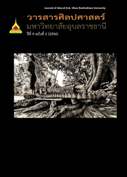Thai Undergraduate EFL Learners’ Apologies: A Speech Act Perspective
Main Article Content
บทคัดย่อ
This research aimed at studying the apology speech act in English by Thai EFL learners in order to determine similarities and differences between EFL learners’ and native speakers’ apology strategies. It also sought to explore potential relationship between offense severity and their apology strategies. The participants were 100 undergraduates majoring in English from Ubon Ratchathani Rajabhat University and 20 native speakers of American English. A discourse completion task (DCT) and oral interviews were used to collect the data. The findings showed that the learners predominantly used key IFID strategies regardless of the scenarios. Other strategies varied across the two groups with some degree of similarities and differences. Also for the Thai learners, there is no relationship between the offense severity and the number of strategy types.The findings were attributable to cultural and individual differences and learners’ language proficiency levels.
การกล่าวคำขอโทษโดยผู้เรียนภาษาอังกฤษเป็นภาษาต่างประเทศระดับปริญญาตรี: มุมมองเชิงวัจนกรรม
งานวิจัยนี้มีวัตถุประสงค์เพื่อศึกษาการกล่าวคำขอโทษโดยผู้เรียนชาวไทยที่เรียนภาษาอังกฤษเป็นภาษาต่างประเทศในระดับปริญญาตรีเพื่อเปรียบเทียบความคล้ายคลึงระหว่างรูปแบบต่างๆของการขอโทษระหว่างผู้เรียนกับเจ้าของภาษา ผู้ให้ข้อมูลคือนักศึกษาระดับปริญญาตรีมหาวิทยาลัยราชภัฏอุบลราชธานี จำนวน 100 คน และผู้พูดภาษาอังกฤษเป็นภาษาที่หนึ่งจากสหรัฐอเมริกาจำนวน 20 คน วิธีการเก็บข้อมูลคือ แบบจำลองสถานการณ์ให้เติมความให้สมบูรณ์ และ การสัมภาษณ์ ผลการศึกษาหลักๆคือผู้เรียนมักใช้เครื่องมือแสดงเจตนาแบบต่างๆเป็นกลยุทธ์หลักไม่ว่าสถานการณ์จะเป็นอย่างไร ทั้งสองกลุ่มใช้กลยุทธ์อื่นๆในลักษณะที่ทั้งคล้ายคลึงและแตกต่างกัน นอกจากนี้ในกลุ่มผู้เรียนชาวไทย ไม่พบความสัมพันธ์ระหว่างระดับความรุนแรงของความผิดและจำนวนประเภทของกลยุทธ์ กล่าวได้ว่าผลการศึกษาดังกล่าวเป็นผลมาจากความแตกต่างทั้งทางวัฒนธรรมและทั้งพฤติกรรมรายบุคคล รวมไปถึงระดับความสามารถทางภาษา


